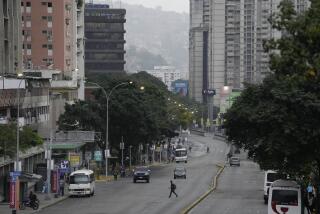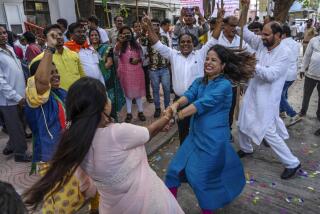Gandhi’s Candidate Elected President of India
- Share via
NEW DELHI — Indian Prime Minister Rajiv Gandhi scored a significant political victory Thursday as it was announced that his candidate for the country’s presidency, Ramaswamy Venkataraman, had easily defeated his opponents, winning more than 70% of the vote.
However, internal rivalries that developed during the indirect presidential election, in which members of the national Parliament and state legislatures voted Monday by secret ballot, threaten now to split Gandhi’s ruling Congress-I Party.
In a dramatic development Thursday night, former Gandhi finance and defense minister Vishwanath Pratap Singh, a powerful politician from Uttar Pradesh state, offered his resignation from the party. If Gandhi accepts, some political observers feel it would establish Singh as the undisputed leader of the national opposition.
Singh, a Rajput prince who was once the star of the Gandhi Cabinet, built a reputation as a reformer and populist crusader during his two years as Gandhi’s finance minister. In his resignation letter, Singh protested the prime minister’s dismissal of three prominent party members, including Gandhi’s own cousin, from the Congress-I Party on Wednesday. Singh described the dismissals of Gandhi’s cousin, Arun Nehru, 43; of Vidya Shukla, 58, and of Arif Mohammed Khan, 36, as “undemocratic and dictatorial.”
The three men and Singh have all been recently united as undeclared leaders of the dissident faction of Congress-I, which itself is the result of a split in a party that started 100 year ago as the political arm of the India Freedom Movement.
Gandhi supporters allege that all four men were involved behind the scenes in a failed effort to embarrass Gandhi politically in Monday’s presidential election. Their strategy apparently was to persuade outgoing President Zail Singh, with whom Gandhi has had an ongoing feud, to run for a second term.
Huge Parliamentary Majority
Although Gandhi enjoys a huge majority in the two houses of Parliament, his opponents hoped that a Zail Singh candidacy would entice Gandhi party members to split the ranks in the secret ballot, forcing a vote of confidence on Gandhi’s leadership.
The strategy failed after the two Indian Communist parties refused to participate and Zail Singh refused to run. Gandhi, who also serves as party president, waited two days after the vote to dismiss Nehru, Shukla and Khan. Sources said V.P. Singh was exempted because of fears that his expulsion would make him a “martyr.”
V.P. Singh has made several recent appearances with the now dismissed party members in which they criticized “corruption” within the ruling party.
“We were saying remove corruption,” said Khan, a prominent Muslim politician, after his dismissal. “Now they have removed us.”
The four dissidents could form the nucleus of a new opposition party, with V.P. Singh as the leader. Such a party could conceivably challenge Gandhi in elections that the law requires to be held by late 1989.
Although Gandhi’s national popularity has fallen precipitously in recent months, at least according to polls and the results of several state elections, the opposition has been unable to take advantage of the situation because it has no nationally accepted leader to challenge the prime minister, whose family has ruled India for 35 of the 40 years since independence.
However, the victory of the 77-year-old Venkataraman, Gandhi’s candidate in the presidential election, virtually ensures that the prime minister will be able to continue in office for at least the last two years of his term, despite the steep decline in his popularity since he took over from his assassinated mother, Indira Gandhi, in November, 1984.
No Challenge to Gandhi
Venkataraman, who was vice president and has a long record of party loyalty, is unlikely to challenge Gandhi in the way his predecessor, Zail Singh, did. At one point, Zail Singh was being pushed by opposition leaders to use his powers to remove Gandhi from the prime ministership and dismiss his government.
However, while under the Indian constitution, the president is the head of state, he is required to obey the orders of a council of ministers headed by the prime minister.
“No power on earth can remove the prime minister from his office so long as he enjoys the confidence of the Lok Sabha (the Indian lower house of Parliament),” Venkataraman said Wednesday.
Voting in the presidential election is weighted according to the population of the area represented by the members of Parliament and state legislators. The Congress-I Party controls about 60% of the Parliament and state legislators. Venkataraman won with more than 70% of the votes cast, a victory that Gandhi described Thursday night as proof that his party remains “intact and united.” He defeated former Supreme Court Justice V.R. Krishan Iyer, the candidate of a 14-party opposition coalition, and an eccentric independent candidate named Mithilesh Kumar Sinha.
Venkataraman, a south Indian Tamil and a lawyer who was once jailed by the British in the struggle for independence, is expected to be sworn in July 25.
More to Read
Sign up for Essential California
The most important California stories and recommendations in your inbox every morning.
You may occasionally receive promotional content from the Los Angeles Times.













